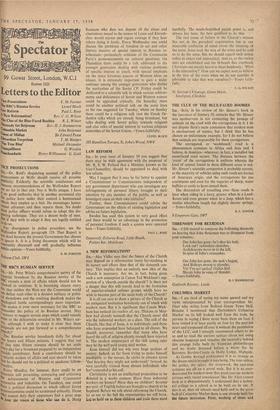A NEW REFORMATION?
Sta,—Alec Vidler says that the future of the Church may depend on a reformation 'more far-reaching in its nature and effects than that of the sixteenth cen- tury.' This implies that an 'entirely new idea of the Church is necessary. Are we, in fact, being given such a new conception in Canon Ted Wickham's sug- gestion of a 'church outside the church'? Is there not a danger that this will merely lead to the formation of superior-minded splinter groups whieh have no wish to become part of the main body of the Church?
It is all too easy to draw a picture of the Church as an antiquated institution hopelessly out of touch with modern man. But it is significant that Canon Wick- ham has noticed (as readers of, say, Dickens or May- hew had already noticed) that the Church never did win the industrial workers as a class. The call of the Church, like that of Jesus, is to individuals; and those who have responded have belonged to all classes. We should, moreover, remember that many who have heard the call of religion plainly enough have rejected it. The modern counterpart of the rich young ruler may be the well-paid young steel worker.
Jesus himself did not win over large sections of society. Indeed, so far from trying to make himself intelligible to the masses, he spoke in obscure terms `that hearing they might not understand.' Instead. he very carefully trained those chosen individuals who had resnonded to his call. '
Christianity is not an intellectual proposition to be debated in a works canteen. Have these industrial workers no homes? Have they no children? Seventy per cent. of English babies arc brought to church to be baptised. Before we talk about reforming the Church, let us use to the full the opportunities we still have. Lel us hold on to these children and train them most
carefully. The much-despished parish priest is, and always has been, the best qualified to do this.
The real cause of failure in the Church's witness lies not in the, parochial organisation but in our miserable, confusion of mind about the meaning of the cross. Jesus took the way of the cross and he told us to do the same. But we should regard such action today as abject and unpractical. And so, as the rocket sites are established and the H-bomb flies overhead, Christians are merely heard to bleat helplessly : 'What is the alternative?' How can we expect men to believe in the way of the cross when we do not consider it advisable to take that way ourselves?—Yours faith- fully,
Stockport, Cheshire






























 Previous page
Previous page